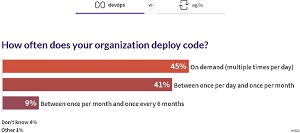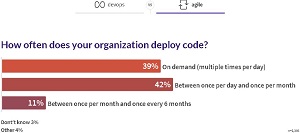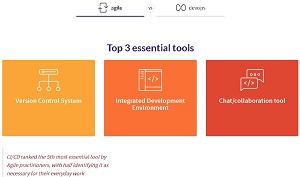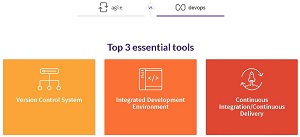Upgrade & Secure Your Future with DevOps, SRE, DevSecOps, MLOps!
We spend hours on Instagram and YouTube and waste money on coffee and fast food, but won’t spend 30 minutes a day learning skills to boost our careers.
Master in DevOps, SRE, DevSecOps & MLOps!
Learn from Guru Rajesh Kumar and double your salary in just one year.
Source – techtarget.com
One interesting aspect of the new developer report from GitLab Inc. — a company based on the open source GitLab project — is a comparison of two popular development approaches Agile and DevOps.
The GitLab project’s Community Edition provides a complete open source software development platform featuring built-in version control, issue tracking, code review and Continuous Integration/Continuation Delivery (CI/CD).
In its new “2018 Global Developer Report” based on a survey, GitLab Inc. covered a wide range of topics, including how its traditional DevOps approach compares with Agile software development methodology.
One take (among many) on the differences between the two approaches comes from Agile Buddha, which said: “DevOps is mainly the widening of Agile’s principles to include systems and operations instead of stopping its concerns at code check-in. Apart from working together as a cross-functional team of designer, tester, and developer as part of an Agile team, DevOps suggests adding operations as well in the definition of a cross-functional team.”
GitLab’s comparisons of the two methodologies — which often are characterized as not being in opposition to one another, but rather as being complementary to one another — resulted in this key finding: “Organizations that have adopted DevOps are more likely to deploy on demand and prioritize automation than those practicing Agile.”
Backing up that observation is this data point from the survey: “71 percent of respondents who practice DevOps also agreed automation is a high priority, compared to 60 percent of respondents who practice Agile.”
GitLab also asked respondents how often their organizations deploy code and separated the answers by the dev approach followed. Here are two graphics demonstrating the differences between the two camps:


The report also compared the top three tools cited by each camp, finding only one difference:


The comprehensive report also touched on many other different subjects, and GitLab provided these key, high-level findings in addition to the Agile vs. DevOps angle:
- Managers tend to have more of an optimistic perspective on the status of their team’s overall satisfaction, productivity, and the benefits of open source tools.
- While nearly all agree it’s important to work in a collaborative environment and a strong majority (81 percent) say it’s easy to collaborate with their team and others within their organization, visibility and transparency continues to lag with nearly half of developers (42 percent) reporting unclear direction as their top challenge to getting work done.
- High-performing teams have access to better tools, spend less time context-switching, and are more likely to work remotely than their lower-performing counterparts.
- Overall, remote teams report higher levels of satisfaction than those working in-office, including higher levels of visibility, better insight into the deployment process, and a strong DevOps culture.
- IT leaders plan to invest the most in continuous integration, delivery, and deployment in 2018, and cite selecting the right technology as their greatest challenge.
GitLab collected responses to its survey for one month last fall, soliciting responses from its social media channels and newsletter.

 Starting: 1st of Every Month
Starting: 1st of Every Month  +91 8409492687 |
+91 8409492687 |  Contact@DevOpsSchool.com
Contact@DevOpsSchool.com